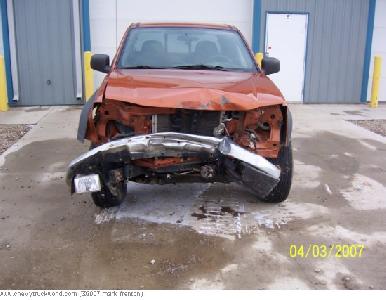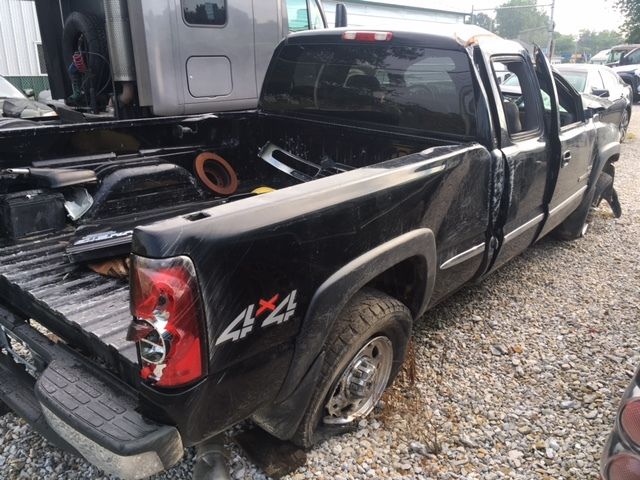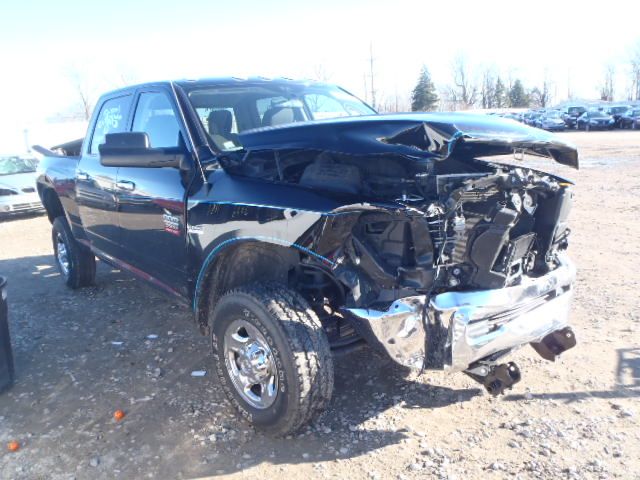Wrecked Diesel Trucks For Sale: Unearthing Value from the Rubble pickup.truckstrend.com
The roar of a diesel engine, the impressive torque, and the sheer durability of a heavy-duty truck are attributes that appeal to many. But what happens when these titans of the road meet an unfortunate end, suffering significant damage from accidents, natural disasters, or mechanical failures? They often end up as "wrecked diesel trucks for sale." Far from being mere scrap, these damaged vehicles represent a unique and often highly lucrative opportunity for a specific breed of buyer: the savvy mechanic, the parts scavenger, the aspiring rebuilder, or the budget-conscious enthusiast.
This comprehensive guide delves into the world of wrecked diesel trucks for sale, exploring the motivations behind their purchase, the different types of damage encountered, where to find them, and the crucial steps and considerations involved in turning a potential pile of junk into a valuable asset. Whether you’re looking for a donor vehicle for a specific part, a challenging restoration project, or a smart investment, understanding this niche market is key to success.
Wrecked Diesel Trucks For Sale: Unearthing Value from the Rubble
Why Buy a Wrecked Diesel Truck? Unlocking Hidden Potential
The primary allure of wrecked diesel trucks lies in their significantly reduced price point compared to their road-worthy counterparts. However, the benefits extend far beyond initial savings:
- Cost-Effective Parts Harvesting: Diesel truck components – engines, transmissions, axles, turbos, injection systems, and even specific body panels – are notoriously expensive when purchased new or even used from a specialized dealer. A wrecked truck, even one with extensive damage to the body or frame, might have perfectly salvageable, high-value mechanical components that can be extracted and sold individually or used for another project. This is often the most common reason for purchase.
- Project Vehicle & Rebuilding: For individuals with mechanical expertise, access to a shop, and a passion for restoration, a wrecked diesel truck can be a rewarding rebuild project. Many trucks are "totaled" by insurance companies not because they are irreparable, but because the cost of repair exceeds a certain percentage of their market value. This leaves a significant margin for a DIY enthusiast to perform the repairs at a fraction of the cost, potentially resulting in a road-worthy truck for a significantly lower overall investment.
- Learning Opportunity: Working on a wrecked truck provides invaluable hands-on experience. Diagnosing damage, disassembling complex systems, and rebuilding a vehicle from the ground up offers a steep learning curve for aspiring mechanics and seasoned professionals alike.
- Potential for Profit: With the right skills and market knowledge, buying a wrecked diesel truck, repairing it, and then reselling it for a profit (often referred to as "flipping") can be a viable business model. Alternatively, parting out a truck with a high-value engine or transmission can yield substantial returns, often recouping the initial purchase price and more.
- Customization Base: A wrecked truck can serve as a cheap starting point for a highly customized build, where the original body and interior might be replaced or heavily modified anyway.

Understanding the Damage: Types of Wreckage and Their Implications
Not all "wrecked" trucks are created equal. The nature and extent of the damage profoundly impact the truck’s value, repairability, and the potential parts it offers. Understanding these categories is crucial for making an informed decision:

- Front-End Collision: Common and often severe. Damage can include the engine, radiator, frame rails, suspension components, and front bodywork (fenders, hood, bumper). Engines might be compromised (cracked blocks, damaged accessories) or perfectly fine if the impact was primarily structural. Frame damage is a major concern, as it can be costly and difficult to repair properly.
- Rear-End Collision: Typically affects the bed, tailgate, rear bumper, and possibly the rear frame section. Less likely to impact the engine or transmission unless the impact was extremely severe and buckled the entire frame. Good for cab-and-chassis conversions or if you need a front clip.
- Side Impact: Damages the cab, doors, pillars, and potentially the frame if the impact was directly on the chassis. Engine and drivetrain are often untouched, making these good candidates for mechanical donors or if a new cab can be sourced.
- Rollover: Can cause extensive damage to the roof, pillars, windows, and entire body structure. Often results in a "total loss" due to structural integrity issues. Mechanical components might be intact, but frame twist and body damage make rebuilding challenging and expensive.
- Flood Damage: One of the most insidious forms of damage. Water, especially saltwater, corrodes electronics, rusts metal components, and can hydro-lock engines. While externally a truck might look good, the internal electrical nightmare and long-term corrosion issues make these very risky buys, primarily suitable for very specific part needs (e.g., body panels that were above the water line).
- Fire Damage: Ranges from minor under-hood fires to complete vehicle incineration. Heat warps metal, melts plastics, and destroys electronics. Depending on the extent, only the block or heavy frame components might be salvageable. Very high risk.
- Theft Recovery: Often involves damage to the ignition, steering column, and sometimes stripped interior or exterior components. Mechanicals are usually fine, making these good for relatively straightforward repairs if the missing parts are manageable.
- Mechanical Failure: The truck might be visually intact but have a seized engine, blown transmission, or other major mechanical fault. These are often excellent candidates for rebuilding or engine swaps, as the body and frame are typically undamaged.

Where to Find Wrecked Diesel Trucks for Sale
Finding the right wrecked diesel truck requires knowing where to look beyond your local classifieds.
- Salvage Auctions (Online & Physical):
- Copart: One of the largest global online auction platforms for salvage and wholesale vehicles. They have thousands of vehicles listed daily, including a vast selection of wrecked diesel trucks from various makes and models (Ford Power Stroke, Dodge Cummins, Chevy Duramax, etc.).
- Insurance Auto Auctions (IAAI): Another major player, similar to Copart, offering a wide array of damaged vehicles from insurance companies.
- Advantages: Huge selection, detailed damage reports (often with photos), VIN information.
- Disadvantages: Requires a broker license for some vehicles, buyer fees, vehicles sold "as-is" with no guarantees. Inspection can be limited.
- Local Tow Yards & Impound Lots: These places often have vehicles that were recovered from accidents or impounded and never claimed. Prices can be negotiable, but selection is limited, and vehicles are typically sold quickly.
- Online Marketplaces (Caution Advised):
- eBay Motors: Dedicated section for salvage/damaged vehicles. Good for finding specific models or parts.
- Facebook Marketplace & Craigslist: Can yield local gems from private sellers.
- Caution: Higher risk of misrepresentation. Always verify information, inspect in person, and be wary of deals that seem too good to be true.
- Specialized Diesel Forums & Groups: Online communities for diesel truck enthusiasts often have "for sale" sections where members might be selling wrecked trucks or specific components. These can be good sources for detailed information and honest sellers.
- Word-of-Mouth from Mechanics/Body Shops: Local repair shops might know of vehicles that customers decided not to fix and are looking to sell for parts or as a project.
The Buying Process: A Step-by-Step Guide to Smart Acquisition
Purchasing a wrecked diesel truck is not like buying a running vehicle. It requires meticulous research, careful inspection, and an understanding of the legalities.
-
Define Your Goal: Are you looking for a specific part (e.g., a Cummins 5.9L engine), a full rebuild project, or something to part out for profit? Your goal will dictate the type of damage you can tolerate and the budget you set.
-
Research the Vehicle & Common Issues: If you’re targeting a specific make and model (e.g., a 6.7L Power Stroke or a 6.6L Duramax), research common failure points for that engine/truck. This will help you identify potential hidden issues even in a wrecked vehicle.
-
Thorough Inspection (Crucial!): This is the most critical step.
- On-Site Inspection: If possible, always inspect the vehicle in person. Bring a flashlight, a magnet (to check for body filler), and even a mechanic if you’re not confident in your own assessment.
- Photos & Damage Reports: For online auctions, scrutinize every photo. Read the damage report carefully, noting the primary and secondary damage. Look for signs of flood or fire damage (mold, rust lines, burnt wires).
- VIN Check: Run a comprehensive VIN report (CarFax, AutoCheck). This will reveal previous accidents, title history, mileage discrepancies, and service records.
- Frame Inspection: Look for kinks, bends, or cracks in the frame rails. Frame damage is expensive and difficult to correct.
- Engine & Drivetrain: Check for visible leaks, cracked blocks, or major component damage. If possible, try to turn the engine by hand (with a wrench on the crankshaft bolt) to see if it’s seized. Look at the oil dipstick and transmission fluid for signs of water contamination.
- Interior & Electronics: While secondary, assess the condition of the interior and look for signs of electrical issues (burnt wires, corrosion).
-
Understand Vehicle Titles:
- Salvage Issued when a vehicle has been deemed a total loss by an insurance company. It can be rebuilt but will always carry this branding, affecting future resale value.
- Rebuilt/Restored Issued after a salvage vehicle has been repaired, inspected by the state, and deemed roadworthy. While better than a salvage title, it still signals prior significant damage.
- Junk/Scrap Means the vehicle is not intended for road use and is typically for parts only. Cannot be registered.
- Clear Rare for wrecked vehicles, indicating no prior branding. If a severely damaged truck has a clear title, be very suspicious.
-
Bidding & Negotiation:
- Set a Budget: Determine your maximum bid, including all fees (auction fees, buyer fees, transportation, potential repair costs). Stick to it.
- Auction Strategy: Bid strategically. Don’t get caught up in bidding wars.
- Direct Negotiation: If buying from a private seller or tow yard, negotiate firmly. Highlight the risks and costs involved in fixing a wrecked vehicle.
-
Transportation: Wrecked trucks are often non-running. Factor in the cost of a flatbed tow truck or specialized transport service from the auction yard or seller’s location to your shop.
-
Paperwork: Ensure you receive the correct title (salvage, junk, etc.) and a bill of sale that accurately describes the vehicle and its condition.
Important Considerations and Potential Challenges
Buying a wrecked diesel truck is not without its risks. Awareness of these challenges can help you avoid costly mistakes.
- Hidden Damage: The biggest wildcard. What looks like minor body damage can hide a bent frame or a damaged engine mount. Always assume there’s more damage than meets the eye.
- Cost of Repair & Parts: Repairing a diesel truck can be incredibly expensive. OEM parts are pricey, and labor costs for specialized diesel mechanics are high. Research part costs before bidding.
- Specialized Tools & Skills: Extensive repairs often require specialized diagnostic tools, heavy lifting equipment, and advanced mechanical and bodywork skills. If you don’t possess these or have access to them, your repair costs will skyrocket.
- Time Commitment: Rebuilding a wrecked truck is a significant time investment, often spanning weeks or months, especially if you’re doing it yourself in your spare time.
- Resale Value & Insurance: Even after being repaired, a truck with a salvage or rebuilt title will have a lower resale value than a clear-title vehicle. Furthermore, some insurance companies are hesitant to fully insure rebuilt title vehicles, or they may only offer liability coverage.
- Legal & Regulatory Hurdles: Every state has specific requirements for converting a salvage title to a rebuilt title, often involving stringent inspections and documentation of all repairs. This process can be complex and time-consuming.
Tips for Success in the Wrecked Diesel Market
- Bring an Expert: If you’re not a seasoned mechanic or body shop professional, bring someone who is when inspecting a truck. Their trained eye can spot issues you might miss.
- Set a Hard Budget: Factor in purchase price, auction fees, transportation, parts, and potential labor. Don’t overspend on the initial purchase, leaving no room for the inevitable unexpected expenses.
- Focus on Your Need: If you only need the engine, prioritize trucks with clear engine bays, even if the rest of the truck is demolished. Don’t pay for what you don’t need.
- Don’t Be Afraid to Walk Away: There will always be another wrecked truck for sale. If something feels off, or the damage is worse than anticipated, it’s better to lose a small amount of time than a large amount of money.
- Verify VIN & History: Always, always, always run a VIN check.
- Understand Auction Terms: Read all terms and conditions of any auction platform carefully, especially regarding buyer fees, payment deadlines, and vehicle pick-up windows.
Conceptual Price Table for Wrecked Diesel Trucks
It’s impossible to provide exact prices for wrecked diesel trucks as they vary wildly based on make, model, year, engine type, mileage, and most importantly, the extent and nature of the damage. However, this table illustrates typical price ranges for different damage scenarios and intended uses, offering a conceptual guide. These are estimated ranges and can fluctuate significantly.
| Damage Type/Intended Use | Description | Estimated Price Range (USD) | Key Considerations |
|---|---|---|---|
| Parts Donor (Extreme) | Severe damage (rollover, major fire, catastrophic collision); only specific components are salvageable. | $500 – $3,000 | Engine/transmission may be seized or damaged; primarily for frame sections, axles, or very specific, hard-to-find parts. |
| Mechanical Donor | Visually intact or minor body damage, but major mechanical failure (seized engine, blown transmission). | $2,000 – $8,000 | Excellent for engine/transmission swaps; body and frame often in good condition for other projects. |
| Moderate Collision | Significant front/rear/side damage, potentially frame damage; engine/drivetrain status uncertain. | $3,000 – $12,000 | Requires thorough inspection for frame integrity; engine/transmission may be salvageable or need major repair. |
| Light Collision/Theft | Minor to moderate body damage (fenders, doors, bumper); mechanicals likely intact. | $5,000 – $18,000 | Good candidates for rebuilding; repair costs can still be significant depending on parts availability and labor. |
| Minor Mechanical | Runs and drives, but has known major mechanical issues (e.g., injector problems, turbo issues). | $8,000 – $25,000+ | Often sold by individuals who don’t want to deal with repairs; can be good value if the repair is manageable. |
| Flood/Fire (Extreme) | Extensive water or fire damage; typically only for specific heavy-duty components or scrap metal. | $100 – $1,500 | Highest risk due to electrical and corrosion issues; often sold as "junk" or "scrap." |
Note: These ranges are highly generalized. A 2020 Ford F-350 Power Stroke with minor front-end damage will command a much higher price than a 2005 Dodge Ram Cummins with similar damage.
Frequently Asked Questions (FAQ) about Wrecked Diesel Trucks
Q1: Is it legal to buy a wrecked truck?
A1: Yes, absolutely. It is legal to buy vehicles with salvage, junk, or clear titles. The legality primarily concerns what you can do with the vehicle afterward (e.g., rebuilding and registering it).
Q2: Can I register a salvage title truck for road use?
A2: Yes, in most states. However, it requires the truck to be repaired to a roadworthy condition and then undergo a stringent state inspection process. Once it passes, the title is usually converted to a "Rebuilt" or "Restored" title. The exact process varies by state.
Q3: How much does it cost to fix a wrecked diesel truck?
A3: This is the million-dollar question with no single answer. Repair costs can range from a few hundred dollars for minor cosmetic fixes on a mechanically sound truck to tens of thousands for extensive frame, engine, or body damage. Parts alone for diesel trucks are expensive. Always factor in potential unforeseen costs.
Q4: What’s the best way to inspect a wrecked truck at an auction?
A4: If possible, visit the auction yard in person. Bring a flashlight, a magnet, and an OBD-II scanner if the truck is powerable. Look for fluid leaks, frame damage, signs of flood/fire, and try to turn the engine by hand. Review all provided photos and damage reports meticulously. If an in-person inspection isn’t possible, rely heavily on detailed photos, damage descriptions, and VIN history reports.
Q5: Can I get insurance on a rebuilt title truck?
A5: Yes, but it can be more challenging and potentially more expensive. Some insurance companies may be hesitant to offer full coverage (collision and comprehensive) on a rebuilt title vehicle, or they may only offer liability. Shop around and be transparent about the vehicle’s title history.
Q6: Are parts interchangeable across different years/models of diesel trucks?
A6: To some extent, yes, but it varies greatly by manufacturer and specific component. Engines and transmissions often have similar variants across a generation, but wiring harnesses, computer modules, and body panels can change significantly year-to-year or between trim levels. Always research specific part numbers and compatibility before assuming interchangeability.
Conclusion: A Rewarding Venture for the Prepared
The world of wrecked diesel trucks for sale is a fascinating, high-stakes market. It offers incredible opportunities for those with the mechanical aptitude, the financial foresight, and the patience to navigate its complexities. From salvaging high-value components to undertaking a complete, satisfying rebuild, these damaged giants hold immense potential.
However, it’s not for the faint of heart. The key to success lies in meticulous research, diligent inspection, and a realistic understanding of the potential costs and challenges involved. Approach each "wreck" not just as a damaged vehicle, but as a puzzle waiting to be solved, a project waiting to be undertaken, or a hidden treasure waiting to be unearthed. With the right knowledge and a cautious approach, buying a wrecked diesel truck can indeed be a remarkably rewarding and profitable venture.



